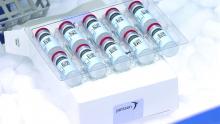It was the second vote in as many days to back a change to a COVID vaccine timeline.
In its vote, the committee said that boosters could be offered to people as young as age 18. However, it is not clear that everyone who got a Johnson & Johnson vaccine needs to get a second dose. The same panel voted Oct. 14 to recommend booster shots for the Moderna vaccine, but for a narrower group of people.
It will be up to a Centers for Disease Control and Prevention (CDC) panel to make more specific recommendations for who might need another shot. The CDC’s Advisory Committee on Immunization Practices is scheduled to meet next Oct. 21 to discuss issues related to COVID-19 vaccines.
Studies of the effectiveness of the Johnson & Johnson vaccine in the real world show that its protection — while good — has not been as strong as that of the mRNA vaccines made by Pfizer and Moderna, which are given as part of a two-dose series.
In the end, the members of the FDA’s Vaccines and Related Biological Products Advisory Committee said they felt that the company hadn’t made a case for calling their second shot a booster, but had shown enough data to suggest that everyone over the age of 18 should consider getting two shots of the Johnson & Johnson vaccine as a matter of course.
This is an especially important issue for adults over the age of 50. A recent study in the New England Journal of Medicine found that older adults who got the Johnson & Johnson vaccine were less protected against infection and hospitalization than those who got mRNA vaccines.
Limited data
The company presented data from six studies to the FDA panel in support of a second dose that were limited. The only study looking at second doses after 6 months included just 17 people.
These studies did show that a second dose substantially increased levels of neutralizing antibodies, which are the body’s first line of protection against COVID-19 infection.
But the company turned this data over to the FDA so recently that agency scientists repeatedly stressed during the meeting that they did not have ample time to follow their normal process of independently verifying the data and following up with their own analysis of the study results.
Peter Marks, MD, director of the FDA’s Center for Biologics Evaluation and Research, said it would have taken months to complete that rigorous level of review.
Instead, in the interest of urgency, the FDA said it had tried to bring some clarity to the tangle of study results presented that included three dosing schedules and different measures of effectiveness.
“Here’s how this strikes me,” said committee member Paul Offit, MD, a professor of pediatrics and infectious disease at Children’s Hospital of Philadelphia. “I think this vaccine was always a two-dose vaccine. I think it’s better as a two-dose vaccine. I think it would be hard to recommend this as a single-dose vaccine at this point.”
“As far as I’m concerned, it was always going to be necessary for J&J recipients to get a second shot,” said James Hildreth, MD, PhD, president and CEO of Meharry Medical College in Nashville.
Archana Chatterjee, MD, PhD, dean of the Chicago Medical School at Rosalind Franklin University of Medicine and Science, said she had changed her vote during the course of the meeting.
She said that, based on the very limited safety and effectiveness data presented to the committee, she was prepared to vote against the idea of offering second doses of Johnson & Johnson shots.
But after considering the 15 million people who have been vaccinated with a single dose and studies that have suggested that close to 5 million older adults may still be at risk for hospitalization because they’ve just had one shot, “This is still a public health imperative,” she said.
“I’m in agreement with most of my colleagues that this second dose, booster, whatever you want to call it, is necessary in these individuals to boost up their immunity back into the 90-plus percentile range,” Dr. Chatterjee said.


